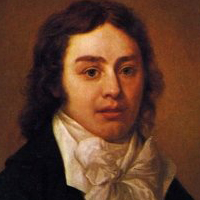Kubla Khan by Samuel Taylor Coleridge: Summary and Analysis
Kubla Khan was written in 1798 but not published until 1816. It was then issued in a pamphlet containing Christabel and The Pains of Sleep. It is one of those three poems which have made Coleridge, one of the greatest poets of England, the other two being The Rime of the Ancient Mariner and Christabel.

S. T. Coleridge (1772-1834)
Coleridge himself describes this poem as the fragment of a dream, a vision seen perhaps under the influence of opium-which he saw when he had fallen asleep after reading the account of Kubla Khan in an old book of travels written by Purchas. Kubla Khan is a brilliant achievement in the field of supernatural poetry.
Coleridge beautifully imagined and skillfully described what he had imagined about a palace about which he had read. He has achieved remarkable success in making the description lively and complete. He writes as if he has seen it before him.
The poem begins with the description of the kingdom of Kubla Khan. The action takes place in the unknown Xanadu (a mythical city). Kubla Khan was the powerful ruler who could create his pleasure dome by a mere order. Alpha was the sacred river that passed through Xanadu. It followed through the measureless caverns (caves) to the sunless sea. There were gardens in which streams were following in a zigzag manner. The gardens had many flowers with sweet smells and the forests had many spots of greenery. The poet gives a beautiful description of the remote and distant land cape of Xanadu.
There was a wonderful chasm sloping down the green hill. The cedar trees were growing on both sides of the chasm. The place was visited by fairies and demons. Coleridge then gives a medieval tale of love and romance. When the moon declined in the night it was visited by a woman. She was sad for her lover. Form the chasm shot up a fountain violently. It threw up stones. They were falling down in every direction. The sacred river Alpha ran through the woods and dales. Then it reached the unfathomable caverns and sank noisily into a lifeless ocean with a tumult. In that tumult Kubla Khan heard the voices of his ancestors. They warned him of approaching war and danger.
In the second part of the poem Coleridge describes the pleasure dome of Kubla Khan. Its shadow floated midway on the waves. There was mixed music of the fountains as well as of the caves. It was bright with sunlight and also had caves of ice. Then the poet tells the reader about his vision. In his vision he saw an Abyssinian maid playing upon her dulcimer. The poet desires to revive their symphony and song. Her music world inspires with divine frenzy. With the divine frenzy he would recreate all the charm of Kubla Khan’s pleasure dome. The poet would be divinely inspired so people would draw a circle around him, and close their eyes with divine fear. The poet must have fed on honeydew and drunk the milk of paradise.
The supreme strength of Coleridge as a poet lay in his marvelous dream faculty; one might say that the dream faculty lay at the root of his greatness as a poet and his weakness as a man." It is this dream element which makes Kubla Khan a thing of wonder in English poetry. Actually the poem had its origin in a dream. One morning Coleridge fell asleep in his chair after taking a dose of opium when he was reading about Kubla Khan in Purchas' Pilgrimage. In his dream he composed, as he himself believes, about two to three hundred lines. On awakening, he appeared to have a distinct recollection of the whole and instantly and eagerly started writing down the lines. When he had written fifty lines he was unfortunately interrupted by a man who had come to him on some business, and detained by him above an hour. On his return to his room, he found that the rest of the dream had passed away from his memory and therefore he could never finish the poem. So the poem is only a dream fragment. In itself the poem possesses the qualities of a dream. It has no logical consistency of ideas. It is a procession of images expressed in language of haunting melody. It contains no story, no thought, no moral, no allegory or symbolism. It is appreciated for its shadowy vision and haunting music.
Kubla Khan is a poem of pure romance. All the romantic associations are concentrated in this short poem. It contains many sensuous phrases and pictures like bright gardens, incense bearing trees laden with blossoms, sunny spots of greenery etc. Then again the description of the Abyssinian maid is very romantic in character:
"A damsel with dulcimer In a vision once I saw: It was an Abyssinian maid, And on her dulcimec she played, Singing of Mount Agora."
Supernaturalism is also a romantic quality. Kubla Khan is a supernatural poem, based on a dream. There are images and expressions in it which are supernatural in character and create an atmosphere of mystery and awe: for example 'caverns measure-less to man', 'a sunless sea', 'that deep romantic chasm' etc. Kubla Khan is a triumph of supernaturalism. It transports us out of the world of everyday life into a world of wonder and romance.
Cite this Page!
Shrestha, Roma. "Kubla Khan by Samuel Taylor Coleridge: Summary and Critical Analysis." BachelorandMaster, 18 Nov. 2013, bachelorandmaster.com/britishandamericanpoetry/kubla-khan.html.
Related Topics
The Rime of the Ancient Mariner: Summary & Analysis
Christabel: Summary and Analysis
Biography of Samuel Taylor Coleridge
 |
bachelorandmaster.com |